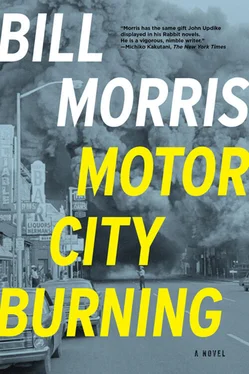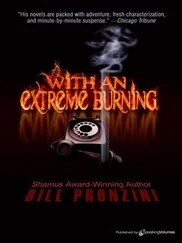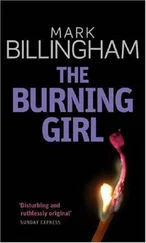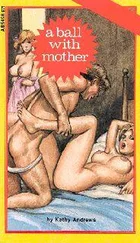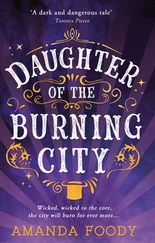“Thanks, Mr. Murphy.”
As the men filed into the locker room, Willie studied Chick Murphy’s business card. Stay on the right track to 9 Mile and Mack! — for the best Buick buys in Michigan! He knew, he just knew he was holding his one-way ticket out of purgatory.

After the dinner shift that night Bob Brewer gave Willie a ride home in his Deuce and a Quarter. The deeper they went into the city the more Willie noticed people pausing on the sidewalks to watch the big bronze boat float past. He could tell his uncle was digging the attention.
When Willie got home he was bone tired from the back-to-back double shifts, but he was too keyed up to sleep. He drank a beer and tried to watch “Mission: Impossible,” but his mind kept drifting. He’d made good progress on one half of his mission; now it was time to get started on the other half.
He went into the bedroom, where his Remington typewriter sat shrouded on the desk between a stack of untouched paper and his old college reading lamp, the one with the dented brown hood over the bulb. He’d brought the typewriter and lamp with him from Alabama because he thought they would provide some vital link to the world he was leaving behind, thought they would spur his memory, make the words flow. He thought wrong.
He set Chick Murphy’s business card on the desk— Stay on the right track to 9 Mile and Mack! — then he dug in the back of the closet and took out his Alabama box and set it on the bed. There was no doubt in his mind that the moment of his story’s conception — the moment when he heard the girl hiss de Lawd —was inside that box. He started removing the contents and placing them on the smooth green blanket.
First came the clothes — the white T-shirt, denim bib overalls and clunky brogan shoes. By 1962 this outfit had replaced sport coats and neckties as the unofficial Snick uniform, a way to blend in with the dirt-poor locals and look more like a “been-here” than a “come-here.” Most of the organizers were college kids or recent dropouts like Willie, well-read in the works of Fanon and Camus and other writers who meant absolutely nothing to a poor black sharecropper, a man who, as often as not, lived in a shack with a tarpaper roof and no running water, a number-three galvanized tub for baths, the interior walls papered with pages from an old Sears catalog. A house made of wood and wind. There would be pot-bellied children everywhere, flies, mangy dogs, clucking chickens. There would be an outhouse in the back yard, a clothesline and a vegetable patch, some ancient car hovering on cinderblocks awaiting repairs that would never come. The only book Willie ever saw in any of those houses was the Bible. The sameness of those places, the stupefying monotony — that, to Willie, was the killing thing about poverty.
He went into the kitchen to make a pot of coffee because he sensed he was in for a long night. While the coffee brewed he put his new Gerry Mulligan-Dave Brubeck album on the stereo, turned down low. Then he took off his tuxedo pants and dress shirt and put on the T-shirt and overalls, still smelling of Duz detergent. He left the brogans unlaced. He had forgotten how good the clothes felt, so loose and free.
He removed an envelope full of black-and-white snapshots from the box. The first one showed Willie holding one of the rifles his brother had shipped to him, piece by piece, from Vietnam, a Remington 700 with a Unertl scope. Wes had snapped the picture one day when they were out in the piney woods near Tuskegee blasting away at Jax beer cans. Willie was wearing shades and smoking a cigarette, trying to look like a badass, but he looked exactly the way he’d always felt around guns: scared pissless.
There were dozens of pictures of Willie in his Snick uniform, mostly taken in Alabama and Mississippi. The pictures blurred together after a while, but one jumped out. It showed Willie talking to a sharecropper named Jess Hocutt in the swept-dirt yard beside his house near Indianola. Behind them was a Stutz Bearcat with no tires. It was always a good idea to go slow with country people, so by way of breaking the ice Willie had asked about the car. Jess had laughed, glad for the chance to talk about something other than the dreaded topic of registering to vote. The last thing Jess Hocutt needed, on top of the rest of his woes, was to bring down the wrath of the white man. It took Willie a whole week of day-long visits to persuade Jess to walk into the Sunflower County courthouse and tell the startled clerk that he wanted to register to vote. It was one of the hardest and most rewarding things Willie had ever done.
When he got to the last snapshot in the envelope, he felt his first shiver. It was a picture of him in his Snick uniform, standing by the reflecting pool during the March on Washington. To complete the bumpkin effect, he was wearing a straw hat. He was deep in conversation with another Snick volunteer, a beautiful brother from New York named Bob Moses who had memorized most of the Bible and dug Camus even more than Willie did — and Bob could read Camus in French. Playing a hunch, Willie opened his journal from the summer of ’63—the notebooks were dated and neatly bundled — and he soon found a long entry about the March, including this exchange with Bob Moses by the reflecting pool:
“Know what this is?” I asked Bob M.
“A couple hundred thousand freedom-high brothers and sisters is what this is,” he replied.
“Yeah, but this ain’t no March on Washington.”
“No? Then what is it?”
“This here’s the FARCE on Washington.”
Bob had guffawed. He knew Willie was mimicking Malcolm X, but he happened to agree with him — and a lot of other people who’d spent years in the trenches. Most Snick foot soldiers viewed the March as nothing more than a public relations stunt scripted by the Kennedys and the F.B.I., with Martin Luther King as their star house-nigger. Their star White House-nigger. Bob and Willie had come to Washington to picket the Justice Department and, almost as an afterthought, they went to the reflecting pool to hear John Lewis, the only speaker from Snick on the day’s program. John’s speech wasn’t bad, but when Willie learned later that the organizers had forced him to water it down, his disdain for the March grew even deeper.
Looking at the photograph of those people packed all the way to the Washington Monument, and remembering what he and Bob Moses had said, Willie realized he’d made his first small breakthrough. If he’d lost faith in King by the summer of ’63, then that meant the trap door had already opened and he had already begun to fall. He kept soldiering on for another year after the March, though he could see now that he was just going through the motions. It’s hard to admit you’re living a lie.
So now he knew that the moment he was looking for — the moment his disillusionment was born — had happened before the Farce on Washington. That still left him with a lot of ground to cover, a little more than three years’ worth, from early 1960 till the summer of ’63. But suddenly he felt hopeful. He refilled his coffee cup and took the rest of his journals and files out of the box and set them on the desk. He started digging through the stack in chronological order, beginning in early 1960.
He was still digging when he heard the first birds and looked up to see that the windows were blue. The night had begun with high hopes after he matched the picture of the Farce on Washington with the corresponding journal entry, but as the night wore on he realized the journals were spotty and thin. Sometimes he wrote dense pages about a night in jail, about the lurid, almost laughable epithets of the white hecklers, about the strange tickly sensation of sitting at a lunch counter and having a white man pour sugar on top of your head and feeling the granules trickle down inside the collar of your shirt. One notation read: Ketchup looks like blood on a starched white shirt. These were the kinds of details he could use. But then there would be gaps where he didn’t write a word for weeks.
Читать дальше
